Items filtered by date: October 2023
Preventing Falls Is A Vital Concern for Every Age
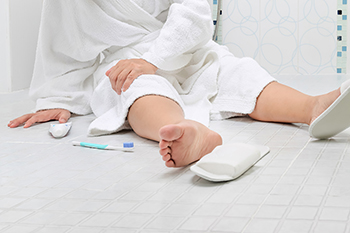
Falls can happen to anyone, regardless of age, and their consequences can be severe. Preventing falls is a critical consideration that extends beyond the elderly. Many factors contribute to falls, including environmental hazards, impaired vision, muscle weakness, and balance issues. One of the fundamental strategies for fall prevention is maintaining a healthy and active lifestyle. Regular exercise, which can improve strength and balance, is a key component. Additionally, assessing and eliminating potential hazards in your surroundings, such as loose rugs or cluttered walkways, is essential. Falling is not an inevitable part of aging, it is a preventable event through awareness, proactive measures, and a focus on health and safety, regardless of your age. Falling can seriously affect the feet. If you would like to have information about how to safeguard the feet from falling, it is suggested that you confer with a podiatrist, who is an expert in matters of the feet and ankles.
Preventing falls among the elderly is very important. If you are older and have fallen or fear that you are prone to falling, consult with Gary Cockrell, DPM from Tennessee. Our doctor will assess your condition and provide you with quality advice and care.
Every 11 seconds, an elderly American is being treated in an emergency room for a fall related injury. Falls are the leading cause of head and hip injuries for those 65 and older. Due to decreases in strength, balance, senses, and lack of awareness, elderly persons are very susceptible to falling. Thankfully, there are a number of things older persons can do to prevent falls.
How to Prevent Falls
Some effective methods that older persons can do to prevent falls include:
- Enrolling in strength and balance exercise program to increase balance and strength
- Periodically having your sight and hearing checked
- Discuss any medications you have with a doctor to see if it increases the risk of falling
- Clearing the house of falling hazards and installing devices like grab bars and railings
- Utilizing a walker or cane
- Wearing shoes that provide good support and cushioning
- Talking to family members about falling and increasing awareness
Falling can be a traumatic and embarrassing experience for elderly persons; this can make them less willing to leave the house, and less willing to talk to someone about their fears of falling. Doing such things, however, will increase the likelihood of tripping or losing one’s balance. Knowing the causes of falling and how to prevent them is the best way to mitigate the risk of serious injury.
If you have any questions, please feel free to contact our offices located in Brentwood and Madison, TN . We offer the newest diagnostic and treatment technologies for all your foot care needs.
The Intricate Relationship Between Gout and Kidney Disease
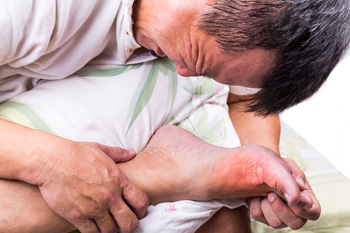
Gout, a form of arthritis, and kidney disease share a complex interconnection that significantly impacts an individual's health. Gout is characterized by the accumulation of uric acid crystals in joints, causing intense pain and inflammation, commonly beginning in the big toe. This can temporarily cause the inability to walk, and medical attention from a podiatrist is often sought. Interestingly, uric acid is primarily filtered and excreted through the kidneys. In individuals with gout, high levels of uric acid can strain the kidneys, potentially leading to kidney stones or reduced kidney function. Conversely, pre-existing kidney issues can hinder the efficient elimination of uric acid, contributing to elevated levels in the bloodstream and subsequent gout attacks. Furthermore, medications commonly prescribed for gout can impact renal function, posing challenges for those already grappling with kidney disease. Understanding and managing this intricate relationship between gout and kidney disease is crucial for comprehensive treatment strategies that address both conditions and enhance overall well-being. If you have developed gout, it is strongly suggested that you are under the care of a podiatrist who can help you manage this condition.
Gout is a foot condition that requires certain treatment and care. If you are seeking treatment, contact Gary Cockrell, DPM from Tennessee. Our doctor will treat your foot and ankle needs.
What Is Gout?
Gout is a type of arthritis caused by a buildup of uric acid in the bloodstream. It often develops in the foot, especially the big toe area, although it can manifest in other parts of the body as well. Gout can make walking and standing very painful and is especially common in diabetics and the obese.
People typically get gout because of a poor diet. Genetic predisposition is also a factor. The children of parents who have had gout frequently have a chance of developing it themselves.
Gout can easily be identified by redness and inflammation of the big toe and the surrounding areas of the foot. Other symptoms include extreme fatigue, joint pain, and running high fevers. Sometimes corticosteroid drugs can be prescribed to treat gout, but the best way to combat this disease is to get more exercise and eat a better diet.
If you have any questions please feel free to contact our offices located in Brentwood and Madison, TN . We offer the newest diagnostic and treatment technologies for all your foot and ankle needs.
Symptoms of Morton's Neuroma
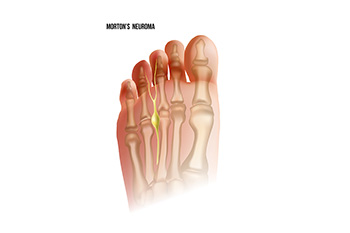
Morton's neuroma is a nerve condition in the feet, often causing discomfort and pain. The primary symptom is a sharp or burning pain typically felt between the third and fourth toes, but it can also extend to the ball of the foot. Individuals with Morton's neuroma may describe a sensation of having a pebble or lump inside their shoe. Additionally, many people experience numbness, tingling, or a feeling akin to standing on a fold in their sock. Pain tends to worsen with walking, wearing tight shoes, or putting pressure on the affected area. People may feel relief by removing their shoes or massaging their foot. These symptoms can be intermittent or chronic, affecting daily activities and quality of life. Recognizing these signs is essential for early intervention and appropriate management of Morton's neuroma. If you suspect you may have this condition, it is suggested that you seek medical advice from a podiatrist who can provide you with an accurate diagnosis and tailored treatment plan.
Morton’s neuroma is a very uncomfortable condition to live with. If you think you have Morton’s neuroma, contact Gary Cockrell, DPM of Tennessee. Our doctor will attend to all of your foot care needs and answer any of your related questions.
Morton’s Neuroma
Morton's neuroma is a painful foot condition that commonly affects the areas between the second and third or third and fourth toe, although other areas of the foot are also susceptible. Morton’s neuroma is caused by an inflamed nerve in the foot that is being squeezed and aggravated by surrounding bones.
What Increases the Chances of Having Morton’s Neuroma?
- Ill-fitting high heels or shoes that add pressure to the toe or foot
- Jogging, running or any sport that involves constant impact to the foot
- Flat feet, bunions, and any other foot deformities
Morton’s neuroma is a very treatable condition. Orthotics and shoe inserts can often be used to alleviate the pain on the forefront of the feet. In more severe cases, corticosteroids can also be prescribed. In order to figure out the best treatment for your neuroma, it’s recommended to seek the care of a podiatrist who can diagnose your condition and provide different treatment options.
If you have any questions, please feel free to contact our offices located in Brentwood and Madison, TN . We offer the newest diagnostic and treatment technologies for all your foot care needs.
It's Time for Beautiful Feet
Understanding an Achilles Tendon Injury
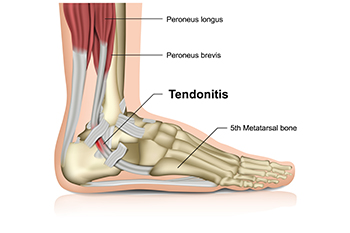
The Achilles tendon is the largest tendon in the body and connects the calf muscles to the heel bone, allowing us to walk, run, and jump. An Achilles tendon injury occurs when the tendon is strained, stretched, or torn. Typically, injuries manifest through pain and stiffness along the back of the leg, near the heel or calf area. Individuals with an Achilles tendon injury may experience localized swelling, tenderness, or warmth around the affected area. In some cases, a noticeable snapping sound may accompany the injury, indicating a severe tear. Pain can worsen during physical activity, particularly when pushing off the foot or standing on tiptoes. Understanding these symptoms is vital for timely medical intervention and appropriate rehabilitation to ensure a swift recovery and regain the functionality of the Achilles tendon. If you have endured an Achilles tendon injury, it is suggested that you are under the care of a podiatrist who can effectively treat this condition.
Achilles tendon injuries need immediate attention to avoid future complications. If you have any concerns, contact Gary Cockrell, DPM of Tennessee. Our doctor can provide the care you need to keep you pain-free and on your feet.
What Is the Achilles Tendon?
The Achilles tendon is a tendon that connects the lower leg muscles and calf to the heel of the foot. It is the strongest tendon in the human body and is essential for making movement possible. Because this tendon is such an integral part of the body, any injuries to it can create immense difficulties and should immediately be presented to a doctor.
What Are the Symptoms of an Achilles Tendon Injury?
There are various types of injuries that can affect the Achilles tendon. The two most common injuries are Achilles tendinitis and ruptures of the tendon.
Achilles Tendinitis Symptoms
- Inflammation
- Dull to severe pain
- Increased blood flow to the tendon
- Thickening of the tendon
Rupture Symptoms
- Extreme pain and swelling in the foot
- Total immobility
Treatment and Prevention
Achilles tendon injuries are diagnosed by a thorough physical evaluation, which can include an MRI. Treatment involves rest, physical therapy, and in some cases, surgery. However, various preventative measures can be taken to avoid these injuries, such as:
- Thorough stretching of the tendon before and after exercise
- Strengthening exercises like calf raises, squats, leg curls, leg extensions, leg raises, lunges, and leg presses
If you have any questions please feel free to contact our offices located in Brentwood and Madison, TN . We offer the newest diagnostic tools and technology to treat your foot and ankle needs.
How Wearing Compression Socks Can Help You at Work
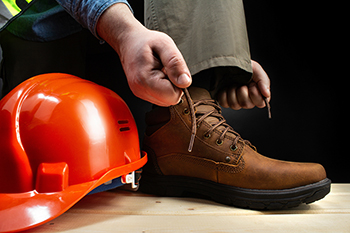
When it comes to working long hours, whether at a desk or on your feet, wearing compression socks has become increasingly recognized as a proactive health measure. Prolonged sitting can reduce blood flow to the legs, potentially leading to blood clots. Standing for extended periods places extra strain on the circulatory system and can cause fatigue and soreness. Jobs requiring extended standing, such as nurses, retail workers, flight attendants, and restaurant staff, benefit from the all-day support provided by compression socks. Similarly, office workers, administrative staff, and those in sedentary roles can protect their legs by wearing compression socks to alleviate fatigue and prevent swelling. The therapeutic pressure of compression socks can promote better circulation, reducing achiness and energizing the legs. If you work in an occupation that requires you to stand or sit for prolonged periods, it is suggested that you make an appointment with a podiatrist to discuss relief methods and other ways to promote circulation in your feet and legs, such as wearing compression socks.
While working on the feet, it is important to take the proper care of them. For more information about working on your feet, contact Gary Cockrell, DPM from Tennessee. Our doctor will treat your foot and ankle needs.
Working on Your Feet
Standing on your feet for long periods of time can cause stress and pain in your feet. Your whole body may experience change in terms of posture, back pain, bunions, callouses and or plantar warts. There are ways to avoid these conditions with proper foot care, smart choices and correct posture.
Positive Changes
Negative heeled shoe – Choosing this shoe type places the heel slightly lower than the ball of the foot. These are great for overall foot health. Find shoes that fit you correctly.
Go barefoot – Our feet were not designed to be enclosed for all hours of the day. Try to periodically expose your feet to air.
Eliminate Pain
Foot Exercises – Performing simple exercises, incorporating yoga and doing stretches are beneficial. This will allow increased blood flow to the area and muscles of the foot.
Achilles tendon – Stretching the foot out flat on the floor will relax the calf muscles and tendon. These exercises can be performed almost anywhere. Make sure you add these exercises to your daily regimen.
With a little bit of this information and knowing more about foot health, you will notice changes. Foot stretches and proper footwear will help with pain and prevent further issues.
If you have any questions please feel free to contact our offices located in Brentwood and Madison, TN . We offer the newest diagnostic and treatment technologies for all your foot and ankle needs.

